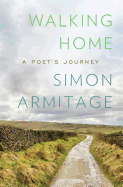
As a memoir of traveling on foot, Simon Armitage's Walking Home is more a cousin to Bill Bryson's A Walk in the Woods than Cheryl Strayed's Wild. It's the amiable story of a 19-day ramble along the 256-mile Pennine Way, bisecting England from the Midlands to the Scottish border--at times a world of stunning beauty, but more often an "unglamorous slog among soggy, lonely moors, requiring endurance and resolve."
Instead of traversing the trail from south to north, as is the custom, Armitage decided to proceed in the opposite direction so he would finish in the town of Edale, near his home. The other reason for his choice of direction--the sense that this way he'd be walking downhill--turns out to be hilariously wrongheaded.
There are no wild animals or outlaws to menace Armitage along the way, but he recounts some frightening moments when he's lost in the mists of the Cheviot Hills or scrambling up a narrow path. The boggy moorlands Armitage navigates bring to mind the works of the Brontë sisters, and he remarks on the hordes of tourists (many of them Japanese) who flock to the ruined farmhouse at Top Withens that may have inspired the Earnshaw house of Wuthering Heights. Armitage shares the path at times with a motley crew that includes his wife and daughter and a college friend nicknamed Slug.
The appeal of a book like Walking Home turns largely on the likeability of its narrator, and Armitage scores high on that scale. Perhaps best of all, he concludes his journey in a way that's as surprising for its candor as it is completely satisfying. --Harvey Freedenberg

